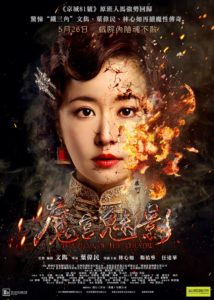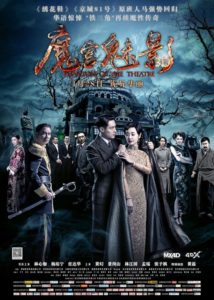Phantom of the Theatre
魔宫魅影
China/Hong Kong, 2016, colour, 2.35:1, 3-D, 118 mins.
Director: Ye Weimin 叶伟民 [Raymond Yip].
Rating: 6/10.
Quality production values aren’t mirrored by the screenplay or most of the leading performances.
Shanghai, early 1930s. After stealing a woman’s handbag, a thief (Li Yang) takes refuge in a disused cinema, the Li Gong 丽宫, which is reputed to be haunted. The police dare not pursue him; inside he is consumed by ghostly fire. At the First National Film Acting Awards, Pan Ruyi (Meng Yao) wins the main prize, but Meng Sifan (Lin Xinru) attracts all the attention by winning Best Newcomer Award. Aspiring film-maker Gu Weibang (Yang Youning), who’s just returned from studying cinema in France, manages to get his script, 夜半歌女 (“Midnight Showgirl”), to Meng Sifan after rescuing her from the attentions of wealthy businessman Tang Shiyao (Lin Jiangguo). Gu Weibang’s girlfriend is Fei Lisi (Huang Huan), a forensic pathologist who has discovered that the thief died from extreme shock and his internal organs burning. Gu Weibang visits the Li Gong theatre and remembers being taken there as a boy by his father Gu Mingshan (Ren Dahua), a warlord, for a private performance by the Kong Family  acrobatic troupe. Gu Mingshan is now an officer in the Nationalist Army, and has an uneasy relationship with his son. Gu Weibang tells the theatre’s owner, Huang (Huang Lei), that he wants to shoot his film there. Huang says it was heavily damaged by a fire 13 years earlier and was later converted to a cinema; he doesn’t believe the rumours that it’s haunted, but the building is no longer used, so he’s happy for the film to be shot there. Meanwhile, as Meng Sifan has agreed to star in it, Tang Shiyao has invested in the production, which also has male star Lu Kang (Wu Xudong). Shooting starts on 14 Dec, but during the first scene Lu Kang is consumed by the same ghostly fire as the thief. Gu Weibang himself takes over his part and finds himself falling for Meng Sifan. When Tang Shiyao makes a move on Meng Sifan after work, she fights off his advances. Afterwards, alone in the theatre, she’s attacked by a masked figure in a cloak, whom she also fights off. Outside the theatre, however, Tang Shiyao is consumed by the ghostly fire.
acrobatic troupe. Gu Mingshan is now an officer in the Nationalist Army, and has an uneasy relationship with his son. Gu Weibang tells the theatre’s owner, Huang (Huang Lei), that he wants to shoot his film there. Huang says it was heavily damaged by a fire 13 years earlier and was later converted to a cinema; he doesn’t believe the rumours that it’s haunted, but the building is no longer used, so he’s happy for the film to be shot there. Meanwhile, as Meng Sifan has agreed to star in it, Tang Shiyao has invested in the production, which also has male star Lu Kang (Wu Xudong). Shooting starts on 14 Dec, but during the first scene Lu Kang is consumed by the same ghostly fire as the thief. Gu Weibang himself takes over his part and finds himself falling for Meng Sifan. When Tang Shiyao makes a move on Meng Sifan after work, she fights off his advances. Afterwards, alone in the theatre, she’s attacked by a masked figure in a cloak, whom she also fights off. Outside the theatre, however, Tang Shiyao is consumed by the ghostly fire.
REVIEW
After Blood Stained Shoes 绣花鞋 (2012) and The House That Never Dies 京城81号 (2014), it’s third time round the Mainland horror block for the team of Hong Kong director Ye Weimin 叶伟民 [Raymond Yip], writer-producer Wen Jun 文隽 [Manfred Wong], Taiwan actress Lin Xinru 林心如 [Ruby Lin] and many of the same key crew. Like House, Phantom of the Theatre 魔宫魅影 is strikingly designed and costumed, and generally a treat for the eyes; but, also like House, it’s let down by a weak script that doesn’t exploit its setup, by the corny dialogue, by a lack of any real horror, and by a central performance from Lin (who also takes an exec producer credit) that’s the acting equivalent of a black hole. In House, Lin’s dramatic vacuum was mitigated by robust playing from Hong Kong’s Wu Zhenyu 吴镇宇 [Francis Ng] and China’s Mo Xiaoqi 莫小棋; in Phantom, alas, there’s only Hong Kong veteran Ren Dahua 任达华 [Simon Yam] to hand, in a role that seems to start off as a cameo and only assumes larger importance near the end. But by then it’s too late.
As signalled by the English title – though not the Chinese one, which is the more generic “Magic Palace, Enchanted Shadows” – the plot is actually a cheeky riff on Gaston Leroux’s novel The Phantom of the Opera, already reworked in at least five Chinese productions of which the best known are the Mainland b&w classic, Song at Midnight/Midnight Song 夜半歌声 (1937), and a lavish Hong Kong colour version, The Phantom Lover 夜半歌声 (1995), directed by Yu Rentai 于仁泰 [Ronny Yu] and starring the late Zhang Guorong 张国荣 [Leslie Cheung]. The screenplay by Wen and his two House co-writers, China’s Yang Meiyuan 杨梅媛 and Li Jingling 李晶凌, sets the action in glitzy 1930s Shanghai and a building that used to be a variety theatre prior to a serious fire; after being converted to a cinema, it was plagued by ghostly rumours and fell into disuse. When a young, foreign-trained film-maker decides to shoot his first film there – driven by memories of being taken as a boy by his father – mysterious deaths follow.
For a lot of the time, the script just bumps along with one scene after another and with no sustained atmosphere or sense of drama. The writers seem at a loss what to do with several characters (a police detective; the male lead’s girlfriend, a forensic pathologist; a randy businessman who invests in the film) and on the acting side there’s a severe lack of spark between Lin, 40, and her younger Taiwan co-star Yang Youning 杨祐宁, 34, who appear to compete with each other in inexpressiveness. The two had better chemistry in House, in which Yang played the lover in flashbacks. It’s not until Ren gets more screen time – as a warlord-turned-Nationalist officer, the father of Yang’s film-maker – that the film develops some oomph, followed by a big explanatory flashback that also has several twists of its own. Echoing House again, Lin takes on several roles, one of which cleverly leads the audience up the garden path.
All of these developments in the final third make entertaining enough viewing; and this being a Mainland horror, the writers do at least get around the necessity of having a rational explanation for everything in a succinct way. But the plot twists and so on are simply tricks, and not involving in the slightest. With such care shown on design, costumes and music – with a memorable set for the theatre itself, in which most of the film takes place – it’s a pity no one could come up with a script of the same calibre. Ye directs with competence but not much imagination: there’s none of the visual sweep of Yu’s 1995 movie (which, though a love story more than a horror film, at least engaged the viewer emotionally in the characters).
Visual effects are more extensive than in House but nothing special. The title of the film-within-a-film, 夜半歌女 (“Midnight Showgirl”), puns on the title of the Chinese Phantoms. Also, the name of Yang’s young film-maker is Gu Weibang 顾伟邦, not a million miles from that of the director of the 1937 film, Ma Xu Weibang 马徐维邦. In further inside jokes, Huang Lei 黄磊, who directed, co-wrote and acted in a 2005 TV drama Phantom, cameos as the theatre’s owner, and Wen himself as a watch-shop owner. Despite 3-D, this Phantom failed to replicate the surprise success of House, taking a ho-hum RMB81 million, only a fifth of the previous film.
CREDITS
Presented by Bona Film Group (CN), Hangzhou Herun Film (CN), Dongyang Hongjing Film & TV Culture (CN), Bona Entertainment (HK). Produced by Hangzhou Herun Film (CN).
Script: Wen Jun [Manfred Wong], Li Jingling, Yang Meiyuan. Photography: Xu Shaojiang. Editing: Ye Wanting. Music: Chen Zhiyi [Yu Peng]. Vocals: Zhu Zirong, Chen Zhiyi [Yu Peng]. Art direction: Yuan Feng. Costume design: Zhang Shijie [Stanley Cheung]. Sound: Feng Jun, Zeng Jingxiang [Kinson Tsang], Li Yaoqiang. Action: Li Zhongzhi [Nicky Li]. Visual effects: Zheng Wenzheng (Shanghai Creasun).
Cast: Lin Xinru [Ruby Lin] (Meng Sifan; adult Kong Lan; teenage Kong Jin), Yang Youning (Gu Weibang), Ren Dahua [Simon Yam] (Gu Mingshan, Gu Weibang’s father), Huang Huan (Fei Lisi, pathologist), Jing Gangshan (Kong Shen), Lin Jiangguo (Tang Shiyao, rich businessman), Zhang Zifeng (young Kong Lan), Meng Yao (Pan Ruyi, winning actress), Huang Lei (Huang, theatre owner), Hu Ming (adjutant), Wu Xudong (Lu Kang, lead actor), Xia Wenxi [Pat Ha] (Gu Weibang’s mother), Han Zhi (Han, driver), Li Xiaochuan (Ma Rulong, police detective), Luo Tianjiao (Xiaomei), Du Qinyi, Li Jiaxuan (actresses at film awards), Li Yang (thief), Wen Jun [Manfred Wong] (watch-shop owner).
Release: China, 28 Apr 2016; Hong Kong, 26 May 2016.
